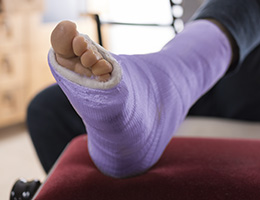
Osteoporosis? Sure, you've heard of it. It's a bone-thinning disease that can lead to fractures. But as a man, you might have put the disease squarely in the not-my-problem category, since it only strikes women, right?
Truth be told, men should pay attention to the health of their bones. That's because men get osteoporosis too.
In fact, as many as 1 in 4 men older than 50 will have an osteoporosis-related fracture, according to the Bone Health & Osteoporosis Foundation (BHOF).
These fractures often occur after age 65, when men and women begin to lose bone at about the same rates, the National Institutes of Health (NIH) reports.
And broken bones can be serious, not to mention painful. Hip fractures, in particular, can be potentially disabling as men get older.
Worse, in many cases, men don't know that their bones are at risk.
Know the risk factors
Besides getting older, many other things can boost a man's risk for osteoporosis, including:
- Lack of physical activity.
- A family history of osteoporosis.
- A diet low in calcium and vitamin D—two critical bone-health ingredients.
- Smoking and excessive alcohol use.
- Long-term use of corticosteroid (steroid) drugs, other drugs that suppress the immune system or anticonvulsant medicines.
- Low testosterone levels, which can be related to steroid use or prostate cancer treatment, for instance.
- Diseases of the stomach, lungs, kidneys and intestines. Some of these conditions make it difficult for the body to absorb dietary nutrients, such as vitamins D and K.
Speak up for your bones
While not every man needs to be tested for osteoporosis, knowing your risk factors can help you and your doctor decide if that might be a good idea.
In addition to being aware of risk factors, be sure to tell your doctor if you experience loss of height, a change in posture or sudden back pain. These could be signs of osteoporosis.
Testing for osteoporosis
A bone density test is advised for any man 50 and over at increased risk for bone loss, according to the BHOF.
Currently, the most accurate test for osteoporosis is dual-energy x-ray absorptiometry (DXA). During this painless procedure, x-ray beams penetrate the body to measure bone density.
Strengthening bones
Treatment can prevent or slow osteoporosis when bone loss is detected early. Medications are approved to treat osteoporosis in men. And men with low testosterone levels may benefit from testosterone replacement therapy, according to the NIH.
Men can also help themselves by taking these bone-sparing steps, recommended by the BHOF:
- Ask your doctor about treatments for conditions that may affect bone strength. If you use medicines known to cause bone loss, discuss alternatives.
- If you smoke, quit. Programs and medications can make this worthy goal easier.
- Avoid excessive use of alcohol. Let your doctor know if you need help quitting or cutting back.
- Get enough calcium and vitamin D. Men over 50 need 1,000 milligrams (mg) of calcium—that goes up to 1,200 mg after age 70—and 600 to 800 IU (international units) of vitamin D every day. Supplements may be needed to meet these goals.
- Engage regularly in weight-bearing and muscle-strengthening exercises if your doctor approves. Examples include walking, jogging, climbing stairs, lifting weights and using resistance machines.
Learn more
For more information about osteoporosis, visit the Bones health topic center.
Reviewed 5/12/2025